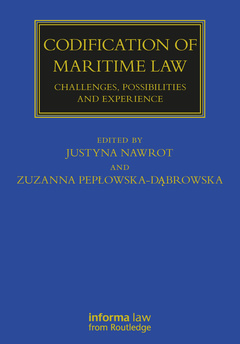Codification of Maritime Law Challenges, Possibilities and Experience Maritime and Transport Law Library Series

This book is the first of its kind to explore the problems inherent in the unification of maritime law. Featuring contributions from leading experts at European maritime law research centres, it considers international conventions, current maritime practice, standard forms and recently adopted or drafted national codifications of maritime law from the codification point of view.
The book is divided into four parts which represent different views on the main topic. Part I gathers chapters dedicated to different aspects and methods of unification of maritime law on a global scale, as well as several specific issues of maritime law from the regulatory point of view. Part II of the book consists of those papers that centre around the issue of transport of goods. Part III is dedicated to codifications of carriage of passengers, cruise law and leisure navigation. Finally, Part IV addresses national codifications of maritime law.
Codification of Maritime Law: Challenges, Possibilities and Experience seeks to provide common ground for future unification of maritime law, which makes the book useful both for private and public maritime lawyers and states? maritime administrations worldwide.
Part I General Remarks 1.Codification: Problems of Differing Legal Cultures 2.Codification and Unification of Maritime Law: Friends or Foes? 3. Unification of Maritime Law – A Failed Strategy? 4. Codification by Treaty of Private Maritime Law from the Perspective of a Public International Lawyer 5. Codification – Best Left to States or to Someone Else? 6. Successes and Failures of Uniform Maritime Law Instruments: Is There Room for a New Approach? 7. The Gap Between EU And EEA Law: Opportunities and Threats of EEA Consolidation 8. The Maritime Labour Convention: A Code of Minimum Rights and Maximum Impact Part II Codification Issues in Transport of Goods by Sea 9.The Rotterdam Rules Codification and International Trade – Harmony or Discord10.Sea Transport Documents in Banks’ Hands - Bridging the UCP with Commercial Shipping Law11.The Challenges Of ICTs in the Shipping Sector Among International Uniform Law, Codification and Lex Mercatoria: The Electronic Bill Of Lading 12.The Future of the Regulation of the Contract for the Multimodal Carriage of Goods in the Context of the Rotterdam Rules 13.Regulation of the Multimodal Carrier’s Liability Regime with a Special Focus of Selected National Maritime and Transport Laws Part III Codification in the Area of Carriage of Passengers and Leisure Navigation 14.The Role of Sailing and Leisure Navigation in the Codification of Maritime Law (in the Framework of the Spanish Maritime Navigation Law of 2014) 15.Yacht Codes – A Solution to the Problem of Equivalent Safety Standards for Large Yachts 16.Claims for Personal Injuries by Cruise Ship Passengers under International and EU Regimes Part IV National Codifications of Maritime Law 17.Maritime Law Codification in Japan: Elements Considered and Those Not Considered18.Codification of Maritime Law: The Experience of Spain 19.The Interrelations between Compulsory Insurance of Shipowners for Maritime Claims and the Shipowner’s Limitation of Liability: A Case of Lack of Coordination in Italy Among Disciplines of Different but Complementary Subjects20.Recent Maritime Law Codifications - Reasons and Scope. The Polish Perspective as Compared with Other Chosen Jurisdictions
Dr Justyna Nawrot is an Assistant Professor at the University of Gdansk, where she teaches maritime law. In 2015, she was nominated as a member of the Polish Codification Commission for Maritime Law. She is a Vice President of the Polish Maritime Law Association, Vice Editor of ‘Prawo morskie’, scientific journal edited by the Polish Academy of Sciences and acts as an arbitrator in maritime disputes. Dr Nawrot has been also member of the Maritime Law Commission’s board under the auspices of Polish Academy of Sciences.
Dr Zuzanna Pepłowska-Dąbrowska is an Assistant Professor at the Nicolaus Copernicus University in Toruń. Since 2015, she has been a member of the Polish Codification Commission for Maritime Law. Dr Pepłowska-Dąbrowska is also Vice President of the Polish Maritime Law Association, a member of the Maritime Law Commission’s board of the Polish Academy of Sciences and an arbitrator in maritime disputes.
Date de parution : 08-2021
17.4x24.6 cm
Date de parution : 12-2019
17.4x24.6 cm
Thèmes de Codification of Maritime Law :
Mots-clés :
Electronic Transport Record; tort liability; Multimodal Transport Operator; maritime labour convention; Maritime Liens; contract law liability; Book III; European maritime law; Cape Town Convention; carriage of passengers; Rotterdam Rules; Hague Visby Rules; Maritime Law; Athens Convention; EU Law; Multimodal Transport; Multimodal Carriage; Transport Documents; Maritime Code; Carrier’s Liability; Documentary Credit; IMO Convention; Hamburg Rules; Straight Bill; EU Legislation; Sea Waybill; EEA EFTA; EEA EFTA States; Transport Law; Multimodal Transportation



